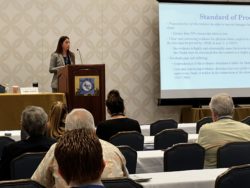Keystone’s attorneys have achieved myriad and significant successes for their clients during the past year. For this first issue of the Keystone Quarterly in 2018, we would like to share with our readers some of these successes:
- Decedent (who had no prior estate plan) executed a trust three-days before her death, which designated one child as sole beneficiary and wholly disinherited her other child. Keystone represented the disinherited child in an action to invalidate the trust. After a three-day trial, the court issued an order invalidating the trust due to decedent’s lack of capacity. Respondent’s defense had focused on proving decedent’s capacity as it existed when she had met with her estate planning attorney – one month prior to the trust’s execution. However, the court agreed with Keystone and focused on the decedent’s capacity at the precise moment of execution, at which time decedent was hospitalized in the ICU and suffered from over a dozen physical ailments, and therefore had far less capacity on that date than she had one month prior.
- Decedent’s trust named his god-son and property manager as equal 50/50 beneficiaries and co-trustees. He subsequently executed an amendment reducing his god-son’s share to $200,000 and increasing the property manager’s share to 100% of the multi-million dollar estate. Along with its co-counsel, Keystone challenged the amendment alleging undue influence, financial elder abuse, and asserted that the property manager was a prohibited transferee who transcribed the amendment. After a multi-day trial, the court not only invalidated the amendment, but it disinherited the property manager who became disqualified from receiving his 50% share under the terms of the original trust. The court also awarded the god-son his attorney’s fees in the amount of $324,719.96. The Second Appellate District affirmed the ruling on appeal.
- Keystone represented decedent’s son who was involved in a dispute with the decedent’s spouse over whether the decedent had created a valid trust leaving multiple parcels of real property to his son. Keystone represented the son and argued that a trust existed notwithstanding the fact that no one (including the son) had a copy of it, and the spouse expressly denied that such a trust ever existed. Keystone put forth evidence that the decedent and spouse had executed Quitclaim Deeds transferring real property into the trust, and testimony from decedent’s CPA regarding the terms of the trust, and maintained that evidence was sufficient to show that the decedent had in fact intended to create a trust. Subsequent to the CPA’s deposition, the spouse produced unsigned copies of the trust. As a result, Keystone negotiated a settlement on terms similar to what the son would have obtained if he had successfully litigated this case through to judgment.
- Decedents, husband and wife, executed a trust naming various individuals as beneficiaries. During their joint lives, one spouse attempted to amend their joint trust by crossing out the names of some individuals directly on the trust instrument and adding the names of others. Following the death of both spouses, the trustees, who stood to benefit from the attempted amendment, took the position that these interlineations were valid. Keystone represented two beneficiaries who had been named in the trust, however, one client’s name had been stricken by the interlineations. Keystone argued that the interlineations were an invalid attempt to amend the trust and also brought claims against the trustees for breach. Ultimately, Keystone negotiated a favorable settlement under which both clients received an inheritance and the trustee was surcharged. Keystone also successfully overcame one trustee’s later attempt to set aside the settlement.
- For a period of two years after the decedent’s death, the trustee-beneficiary failed to notify the other beneficiaries of their interest in the Trust and proceeded to transfer trust assets to herself. Upon learning of these breaches, Keystone represented two beneficiaries and brought an action against the trustee to recover the properties and to surcharge the trustee for substantial losses (e.g., the trustee residing in trust property rent-free and expending liquid trust assets for her own personal benefit). Keystone negotiated a settlement bringing these converted assets back into the trust and distributing a majority of them to the beneficiaries other than the trustee. Keystone was also able to negotiate payment of its attorneys’ fees and costs from the trust on the basis that its services benefited all beneficiaries.
***
Keystone thanks all of its clients for a successful 2017, and wishes everyone a great start to 2018!


















